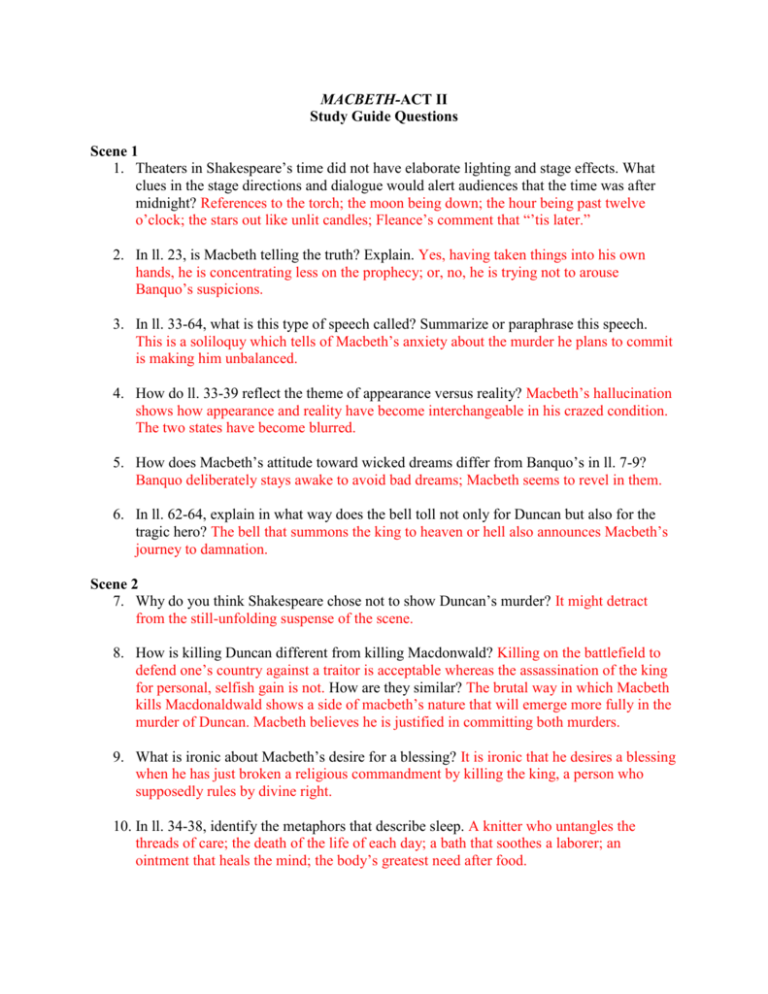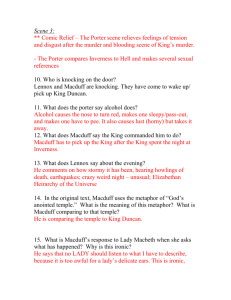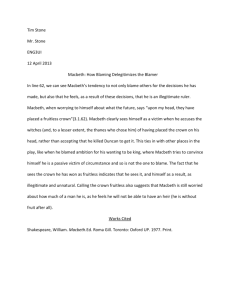MACBETH-ACT II - Fort Bend ISD
advertisement

MACBETH-ACT II Study Guide Questions Scene 1 1. Theaters in Shakespeare’s time did not have elaborate lighting and stage effects. What clues in the stage directions and dialogue would alert audiences that the time was after midnight? References to the torch; the moon being down; the hour being past twelve o’clock; the stars out like unlit candles; Fleance’s comment that “’tis later.” 2. In ll. 23, is Macbeth telling the truth? Explain. Yes, having taken things into his own hands, he is concentrating less on the prophecy; or, no, he is trying not to arouse Banquo’s suspicions. 3. In ll. 33-64, what is this type of speech called? Summarize or paraphrase this speech. This is a soliloquy which tells of Macbeth’s anxiety about the murder he plans to commit is making him unbalanced. 4. How do ll. 33-39 reflect the theme of appearance versus reality? Macbeth’s hallucination shows how appearance and reality have become interchangeable in his crazed condition. The two states have become blurred. 5. How does Macbeth’s attitude toward wicked dreams differ from Banquo’s in ll. 7-9? Banquo deliberately stays awake to avoid bad dreams; Macbeth seems to revel in them. 6. In ll. 62-64, explain in what way does the bell toll not only for Duncan but also for the tragic hero? The bell that summons the king to heaven or hell also announces Macbeth’s journey to damnation. Scene 2 7. Why do you think Shakespeare chose not to show Duncan’s murder? It might detract from the still-unfolding suspense of the scene. 8. How is killing Duncan different from killing Macdonwald? Killing on the battlefield to defend one’s country against a traitor is acceptable whereas the assassination of the king for personal, selfish gain is not. How are they similar? The brutal way in which Macbeth kills Macdonaldwald shows a side of macbeth’s nature that will emerge more fully in the murder of Duncan. Macbeth believes he is justified in committing both murders. 9. What is ironic about Macbeth’s desire for a blessing? It is ironic that he desires a blessing when he has just broken a religious commandment by killing the king, a person who supposedly rules by divine right. 10. In ll. 34-38, identify the metaphors that describe sleep. A knitter who untangles the threads of care; the death of the life of each day; a bath that soothes a laborer; an ointment that heals the mind; the body’s greatest need after food. 11. When one puts gold leaf on something, it is then gilt, a homophone of guilt. How does this pun reflect the theme of appearance versus reality? While appearances (gilt) might conceal reality, they are only a superficial layer barely covering what is truly inside (guilt). 12. How does the imagery concerning blood and water in Macbeth’s speech contrast with that in Lady Macbeth’s speech? He believes that “all great Neptune’s ocean” could not clean his hands, while she claims “a little water clears us of this deed.” What is the significance of this difference? Lady Macbeth is practical---water washes away blood. Macbeth is speaking on a metaphorical level. He believes his sin will contaminate the oceans of the world. 13. In what way does the first line on page 324 convey the message that Macbeth knows the depth of evil to which he has sunk? If he fully acknowledges the horror of his deed, he will be unable to bear knowing he committed it. 14. How serious is Macbeth when he says he wishes Duncan could be awakened by the knocking? Explain. He is serious because he is genuinely horrified by his deed; OR, he is not serious because he knows it is impossible. Scene 3 15. What specific details in the Porter’s speech suggests that the castle is hell? “Porter of hell gate,” “Beezelbub,”, etc. 16. What is the purpose of the Porter appearing in this scene? He provides comic relief, lessening the tension of the events in the act; or, his description of Macbeth’s castle as hell underscores the horrible deed that has taken place there and builds suspense about its consequences. 17. What is ironic about Macduff’s use of the word timely? Macduff’s arrival is not “timely” but too late to save the king. 18. What does Lennox’s speech at the top of page 326 reveal about the belief that nature mirrors the unnatural events in society? Elizabethans firmly believed that when people committed horrible acts, darkness, storms, earthquakes, and unnatural occurrences, such as deformed births, followed. 19. Compare ll. 68-74 to ll. 49-64 in Scene 1. How are Macbeth’s and Macduff’s purposes similar? Both characters are trying to find words that are adequate for the situation--Macbeth to work himself up to commit murder; Macduff to express horror at the evil that has been done. How is the used in each passage? Ironically, the earlier bell signaled the time for Macbeth to commit murder, but here it rings to announce that murder. 20. How does the style of Macbeth’s and Macduff’s announcements of Duncan’s death to the king’s sons differ? Macbeth speaks in metaphors; Macduff is straightforward. 21. What has Macbeth done that was not in the plan? He killed the two grooms. Was this wise? No, there was no reason to complicate the situation with more murders; or yes, Lennox appears to believe Macbeth’s story, and the grooms cannot protest. 22. Why does Macbeth use such extravagant imagery to describe Duncan’s death? His pretentious eloquence is meant to cover up his insincerity. His anxiety and guilt make him ramble on inappropriately. 23. What causes Lady Macbeth to cry out? She follows her own suggestion and makes her “griefs and clamor roar.” She is trying to draw attention away from Macbeth’s absurd and unnatural speech by pretending to faint; or, she is shocked by the murder of the grooms, begins to fall apart, and actually faints. 24. What does the image of Banquo standing in “the great hand of God” suggest about his intent? He intends to stand on the side of righteousness in fighting the “treasonous malice” that killed Duncan. It also suggests that he does not believe that the murder has been avenged yet---in other words, he fears that the grooms were not guilty. 25. What does each of the following characters seem to think of the evidence: Lennox, Banquo, Macduff, Lady Macbeth, Macbeth, Malcolm, and Donalbain? Lennox believes the grooms are guilty, Banquo is not sure but may be suspicious of Macbeth because of what he knows from Act I. Macduff appears to agree with Banquo. Lady Macbeth may think that Macbeth reveals too much with the murder of the grooms and his cover-up speech; or, she may applaud his deception. Macbeth is starting to act on his own, which may mean that he feels confident that the evidence points away from him. Malcolm and Donalbain may not suspect anyone in particular---they just fear for their lives and want to flee. 26. What does Donalbain’s parting comment mean? Those closest to the crown or in line for it are in the most danger of being killed. Scene 4 27. How does the dialogue between the Old Man and Ross compare to Lennox’s speech in Scene 3, ll. 48-54? Like Lennox, Ross and the Old Man present evidence that disorders in nature are mirroring the unnatural death of the king, supporting the Elizabethan idea that the murder is a disruption of natural law. 28. Ross presents an image of Duncan’s horses gone wild and cannibalizing each other. How are the horses a metaphor for Macbeth? Macbeth, too, has been the minion of his race as the savior of his country. He, too, has turned wild, broken out of his rank, and destroyed one of his own. 29. Macduff could appear to be speaking plainly in ll. 22-27. How would the meaning change if you assume that he is speaking ironically? He could be insinuating that there was a plot. Why would he not speak his thoughts openly? He might not speak openly if he lacks proof of a plot, does not trust Ross, or fears being implicated in the serious crimes. 30. What is ironic about Ross’s comment on the motive for the murder? He has the correct motive but the wrong perpetrator. 31. What warning does Macduff convey using the clothing metaphor? He hints that with Macbeth as king instead of Duncan, their new situations (robes) may not suit them as well as their old ones did. 32. Are the last two lines an appropriate end for this bloody act? Explain. The Old Man’s words may foreshadow events or warn that, by attending the coronation, Ross and other Macbeth supporters are opportunistic or hypocritical---trying to “make good of bad, and friends of foes.” The line is appropriate not only because the Old Man is disturbed by recent events, but also because it reinforces the theme of reversal, of “fair is foul.”








